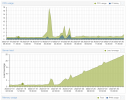Hi-
I know that this is not per-se a proxmox question. I'm seeing a strange pattern with the reported load average of my server. I don't have my resources over committed, and you can see that the increase in load average does not correspond to my CPU usage. When I leave this at this increasing rate, I've seen load average exceed 250, but the server is running fine.
Nothing abnormal with reviewing output of dmesg -T. When I reboot, the problem goes away for a few days, then reappears. I tried shutting down my VM's and LXC's one-by-one and seeing if the load average starts to bend downward, no luck. Only a full reboot fixes.
I keep everything up to date, so I'm running the latest packages (no subscription).
Anyone have any suggestions on where to look?

I know that this is not per-se a proxmox question. I'm seeing a strange pattern with the reported load average of my server. I don't have my resources over committed, and you can see that the increase in load average does not correspond to my CPU usage. When I leave this at this increasing rate, I've seen load average exceed 250, but the server is running fine.
Nothing abnormal with reviewing output of dmesg -T. When I reboot, the problem goes away for a few days, then reappears. I tried shutting down my VM's and LXC's one-by-one and seeing if the load average starts to bend downward, no luck. Only a full reboot fixes.
I keep everything up to date, so I'm running the latest packages (no subscription).
Anyone have any suggestions on where to look?


